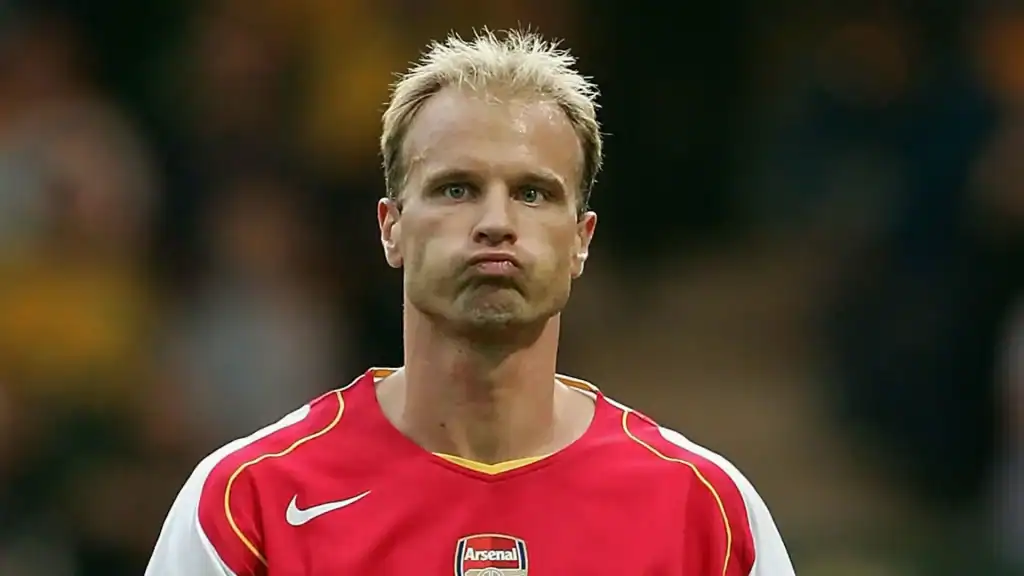Dennis Bergkamp at a Glance
- Net Worth (2025): $50 Million
- Birthdate: May 10, 1969
- Birthplace: Amsterdam, Netherlands
- Profession: Former Professional Footballer, Coach
- Nationality: Dutch
Table of Contents
What is Dennis Bergkamp’s Net Worth?
Dennis Bergkamp has a net worth of $50 million. The Dutch football legend, widely regarded as one of the most technically gifted players of his generation, accumulated his wealth during a stellar 20-year professional career.
Bergkamp’s fortune was built primarily on the lucrative contracts he signed at the peak of his powers. When he joined Arsenal in 1995, he was for a time the highest-paid player in the club’s history. His salary during the 1995-96 season was reported to be £25,500 per week, a figure that made him one of the Premier League’s top earners. This consistent, high-level income over 11 years at one of the world’s richest clubs provided the foundation for his wealth.
His earnings were significantly bolstered by major endorsements, most notably a long-standing and lucrative boot sponsorship deal with Adidas. Since retiring, his net worth has been maintained through investments and various coaching roles.
Early Life
Dennis Nicolaas Maria Bergkamp was born on May 10, 1969, in Amsterdam, Netherlands. He was the youngest of four sons. His father, an electrician and an avid football fan, named him after Scottish striker Denis Law. Bergkamp grew up in a working-class family and began his football journey in the amateur Amsterdam club Wilskracht/SNL. He was scouted by Ajax at the age of 11 and joined their prestigious youth academy, De Toekomst, in 1981.
Career
Dennis Bergkamp’s professional journey began at Ajax, where he was given his senior debut by manager Johan Cruyff on December 14, 1986. He quickly established himself as a prolific forward, winning the Eredivisie title in 1990, the UEFA Cup in 1992, and the KNVB Cup in 1993. He was the Dutch league’s top scorer for three consecutive seasons from 1990 to 1993, and his performances earned him the Dutch Footballer of the Year award in 1991 and 1992.
His success in the Netherlands led to a high-profile transfer to Inter Milan in 1993. Bergkamp’s time in Italy was difficult, as he struggled to adapt to the defensive style of Serie A. Despite winning a second UEFA Cup in 1994, his two seasons at Inter were widely seen as a disappointment.
In 1995, Arsenal manager Bruce Rioch signed Bergkamp for a club-record fee of £7.5 million, a move that would redefine the club. His arrival signaled a new era for Arsenal, but it was under manager Arsène Wenger, who arrived in 1996, that Bergkamp became a global icon. He was the technical catalyst for the team’s shift in philosophy, forming formidable partnerships with Ian Wright and later Thierry Henry. He was the creative center of the teams that won the Premier League and FA Cup “double” in the 1997-98 and 2001-02 seasons. His role in the 2003-04 “Invincible” season, where Arsenal went the entire league campaign unbeaten, cemented his legendary status.
Bergkamp’s career was also defined by his well-documented aviophobia, or fear of flying. This phobia developed after a flight incident with the Netherlands national team in 1994. As a result, he would often travel to European away matches by car or train, and would miss any fixtures that required air travel, earning him the nickname the “Non-Flying Dutchman.”
He represented the Netherlands national team 79 times, scoring 37 goals and playing in two World Cups (1994 and 1998) and three European Championships (1992, 1996, and 2000).
Bergkamp retired from playing in 2006. His testimonial match was the first-ever game played at Arsenal’s new Emirates Stadium. Following his playing career, he transitioned into coaching, returning to his first club, Ajax. He served in various capacities, including as an assistant manager from 2011 to 2017. In recent years, he has expressed interest in returning to football in a coaching or directorial role.


